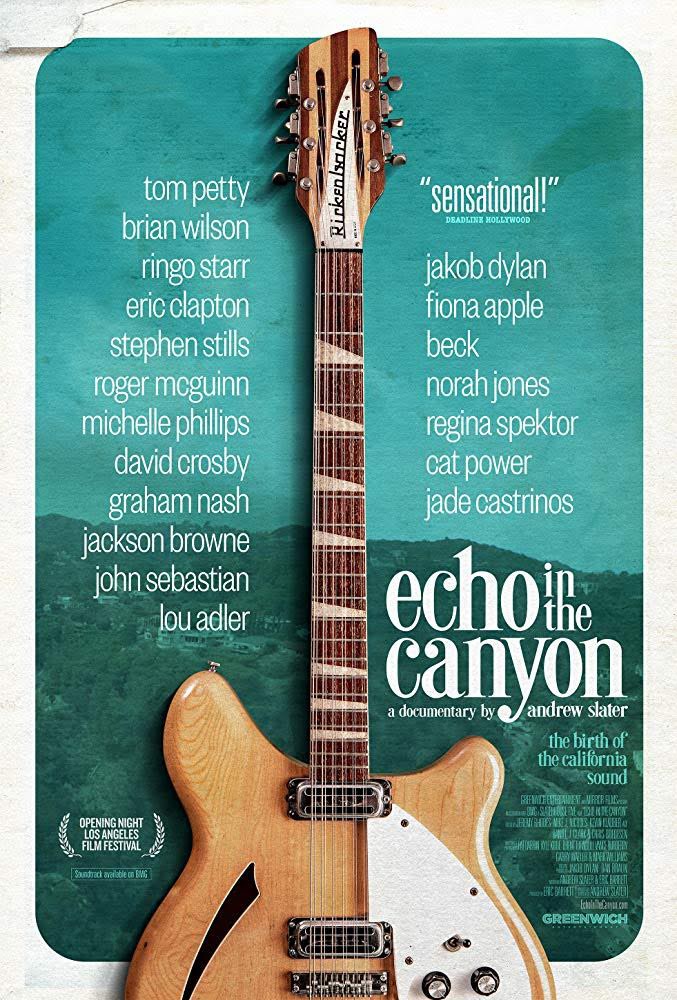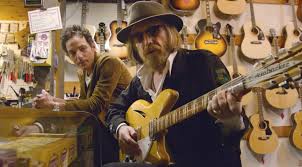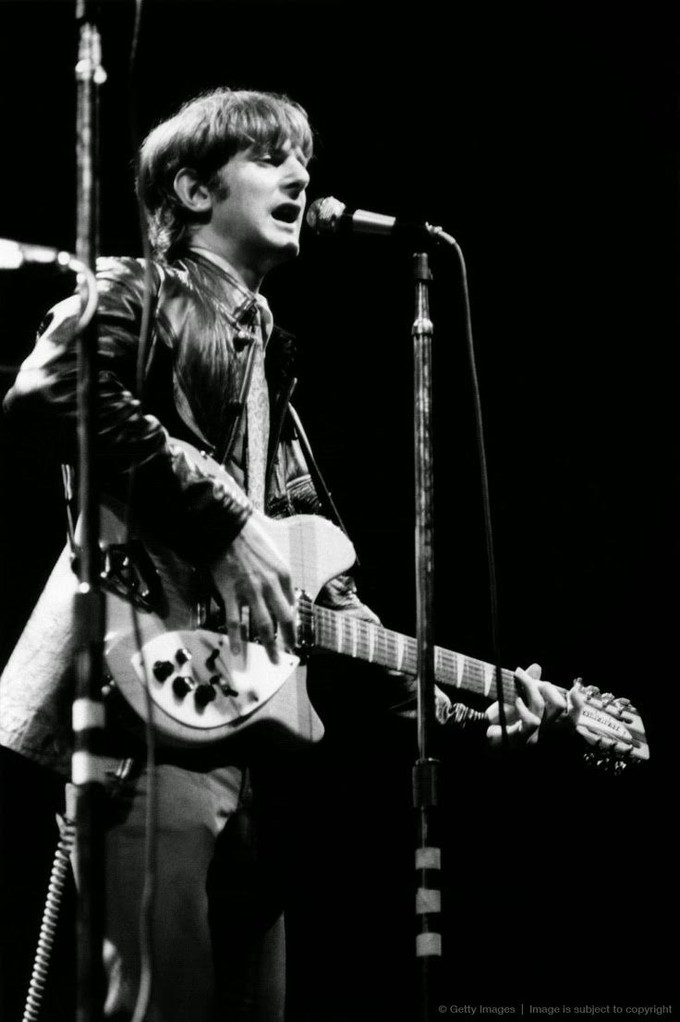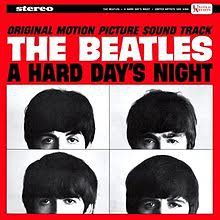
That is exactly what happened in Laurel Canyon, in L.A., from 1965 through 1967. It all began when The Byrds emerged in 1964, and by 1965, they had been joined in their secluded canyon neighborhood by Buffalo Springfield, The Mamas And The Papas, The Beach Boys, and more. Later additions to the tight-knit community would include The Monkees, among others. As a musician, myself, I can only dream of living in such a fervently free and creative environment, but this film lets us live that experience vicariously through the stories and music of the legends who were there. ECHO IN THE CANYON is the story of that time and place, and it is a must-watch for any music fan.
A few of the artists featured in the film have, over the years, been reluctant to grant interviews or discuss the past where certain aspects of their stories are concerned. But this film has them all speaking frankly and openly about a wide variety of touchy subjects. I asked Andy if any of them were a hard sell on being involved. He explained, "You know, one of the things I thought would be good to film would be the conversation between two artists, so I didn't want to use the interviews in a way where you just sort of saw a talking head, or with too much voice-over. I wanted to capture the thing which I'd never really been able to capture as a journalist, which was to show the real humanity in people, and in their faces, when they were telling a story, and to get a personal story. Since a lot of these artists knew Jakob personally, I felt like both he and I would be able to be in a room that wasn't such a rigid interview like a television interview on a network. Luckily, I was able to capture their conversations, so that it feels in the film that you're eavesdropping on something very personal that's being said between two people. Two artists."
This effort pays off, resulting in several unexpectedly personal and candid discussions. I laughingly pointed out David Crosby's (long well-known) forthcoming, brutally frank nature, to which Andy responded, "Yeah, I would say David is the most self-aware of the artists in the film, and you've got to love his ability to convey that self-awareness in an incredibly uninhibited manner."
As I mentioned earlier, the film is intercut with live performances of a concert of covers by Jakob Dylan and friends. I asked Andy which was the chicken, and which was the egg, so to speak, and he broke down the inspiration for, and genesis of, the film. He continued, "He (Jakob) and I saw MODEL SHOP, and we were sitting around and at a point in our lives where we were trying to figure out what to do next, as people often do when they get to be our age. We saw that film, and that film showed us L.A. in a period from 65 to 67 where we go to all these places all the time, and it just inspired us to go back and listen to all this music, even though it wasn't in the film. It also coincided with the 50th anniversary of The Byrds' first record, so that, those two things, gave us the inspiration to examine the songs. I set out, really, to make a record, not to make a film, but the research I was doing led me to think there was something so much bigger to explore, and luckily I found somebody brave enough to finance my creative endeavor."
Given this evolution of ideas, I asked if there was a moment of epiphany like "Wow, all of this incredible music came from one neighborhood over the course of basically two years," or if it was a more gradual thing. Andy explained, "Well, we started out thinking, it's the anniversary of The Byrds' first record, so we're gonna make a film that's an extension of this record we're doing, but we should really look at this migration of people from the East Coast to the West in the early 60s. You know, the idea that California represents freedom and expression was really the genesis of our project because the New York City folk scene was so rigid that maybe folk music maybe would've never been electrified in that environment. What we found, though, was that the real core of the story was what was happening when people were here (L.A.), and the proximity to each other, and the lifestyle, and the time, and the innocence, and the idea that they were all trying to be like the Beatles. In a band with multiple singers and songwriters and living this, what seemed like, a dream... was what was inspiring all of them to create this music that ultimately (in turn) inspired the Beatles, and continues to inspire generations of musicians today." I commented how incredible it was to see these bands, who had been inspired by the Beatles' Rubber Soul, then creating music in answer to it which, in turn, inspired Sgt. Pepper. Andy answered with the statement that sums up the title and purpose of the entire project, "Yeah, that's kind of, you know... echo is reverb, and that's the reverberation of brilliant ideas."


Tom Petty, as mentioned in the opening, is featured in the film in what would be his final interview. I asked Andy what the emotional impact was like when he got the news that he had passed, and that he had captured his last on-camera appearance. Tom was a nearly universally revered artist, and his death resonated with musicians of nearly every genre. "I think there was just an overwhelming sadness for us that he was gone. He wrote so many of the things that I felt, but couldn't say, emotionally, in his songs, and for Jakob, he represents someone as close as one could be to a family member. Jakob inducted him into the Rock And Roll Hall Of Fame, so I don't have to give that history. That's really all you can say about someone's passing, is that you miss them and wish they were still here."
Turning to the second-generation folk-rock artists in the film and beyond, I asked if part of the inspiration for ECHO IN THE CANYON was to inspire future generations of folk-rock artists through the retelling of the history of how it all began. Andy said, "You know, it's possible. I think you make things because you fell something, and both he and I felt, at that moment, I think, a sense of both wonder and gratitude that this music is there, and has been there for us our whole lives. We tried to make it from the heart, you know, and I hope that any artist or creator would do that. What effect is has on other people is really not for us to say. I think the best music that's created is music that's created from a personal place, in hopes that it translates to universal, rather than music that's created with the idea of a universal acceptance and hoping that it translates to personal."
I wondered aloud whether the artists living and working in Laurel Canyon during that brief window of time had any idea of the lasting impact they would have (the answer to this is always no, but it's fun to explore). Andy related, " You know, just relating it to my own experience, I never know when I'm doing something, what effect it's having on anyone else, let alone, myself. It's usually after I've done something that I realize what I've done. I wouldn't recommend that for people. I would say think about an action you're going to take before you take it, but often, in the middle of building something, you just have no sense, and I don't think they did either, but I don't know."

Given that the film covers so many artists who could arguably be called the founding mothers and fathers of the genre, I asked Andy what band, or moment, he would point to and say, 'that was it. That was the beginning.' He gave this very specific, and not really debatable, answer: "Well I think it starts with the Rickenbacker. You have to go to the beginning. When Roger McGuinn electrifies folk music on The Byrds' first album, and you hear his rendition of say, "Bells Of Rhymney", the Pete Seeger song, that is heard by George Harrison, who then writes "If I Needed Someone", and that goes on "Rubber Soul", and Brian Wilson hears Rubber Soul, and HE writes "Pet Sounds", and The Beatles hear "Pet Sounds", and they write "Sgt. Pepper". It goes back to 'what's the beginning of all this', and what's the thing that sets it in motion, and it's probably the Rickenbacker 12-string, in first, the hands of George Harrison, and Roger sees that in "A Hard Day's Night", and then it all gets set in motion. One of the ideas Tom Petty says in the film, is that The Beatles invented the "California Sound," and in a sense, he says, it was the California guys trying to grab hold of that, so I guess it all goes back to The Beatles, my friend."

It normally does. You sometimes look for another answer, but it always eventually comes back around to them, I replied, laughing. Andy responds, "Yeah, they all wanted to be like them; multiple singers, multiple songwriters, you know, living the dream. They made their version of it. The California version of it."
ECHO IN THE CANYON releases on May 24th, 2019, and I would recommend it to any fan of music or follower of music history. It is personal and candid in its handling of the stories of the artists involved, and broad in its observation of the profound impact that these musicians and their songs have had, and will continue to have, as they echo through generations.
Check out the trailer here, and catch it at select theaters May 24th!

That's it for now, so until next time,
Keep it, geek!
Benny No-Good

